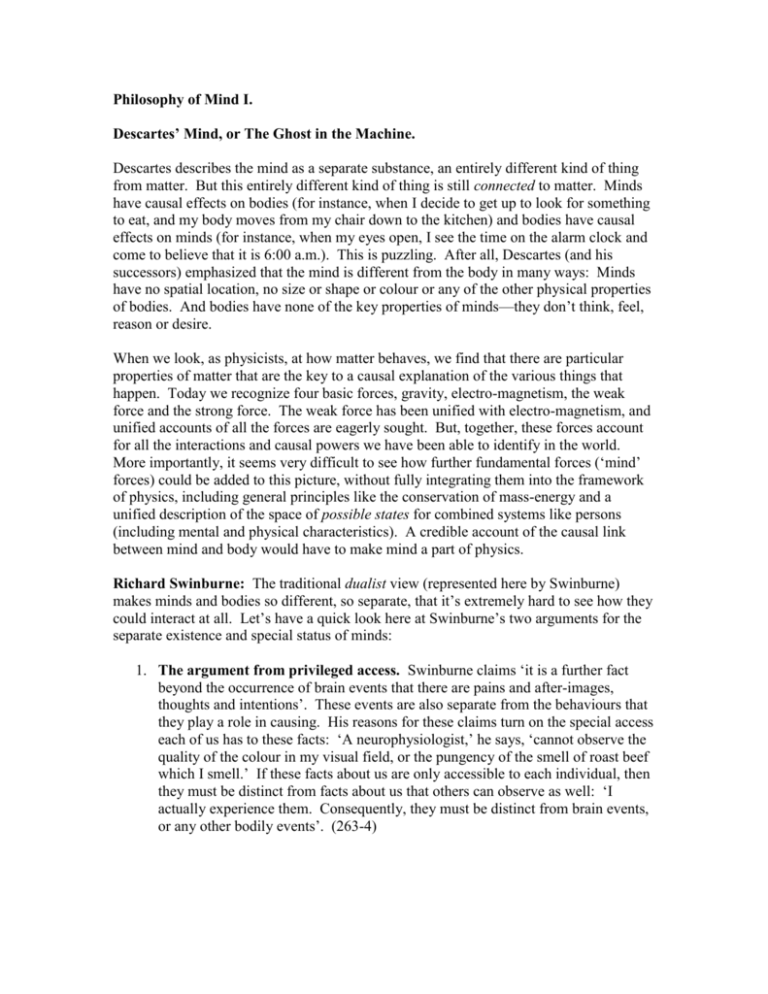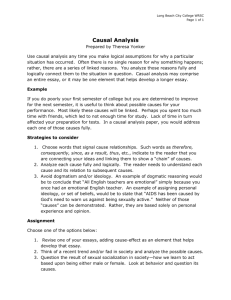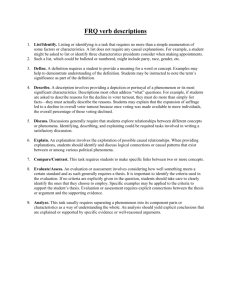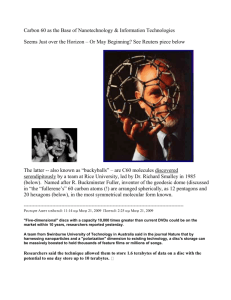Philosophy of Mind I- Swinburne, Jackson, Papineau
advertisement

Philosophy of Mind I. Descartes’ Mind, or The Ghost in the Machine. Descartes describes the mind as a separate substance, an entirely different kind of thing from matter. But this entirely different kind of thing is still connected to matter. Minds have causal effects on bodies (for instance, when I decide to get up to look for something to eat, and my body moves from my chair down to the kitchen) and bodies have causal effects on minds (for instance, when my eyes open, I see the time on the alarm clock and come to believe that it is 6:00 a.m.). This is puzzling. After all, Descartes (and his successors) emphasized that the mind is different from the body in many ways: Minds have no spatial location, no size or shape or colour or any of the other physical properties of bodies. And bodies have none of the key properties of minds—they don’t think, feel, reason or desire. When we look, as physicists, at how matter behaves, we find that there are particular properties of matter that are the key to a causal explanation of the various things that happen. Today we recognize four basic forces, gravity, electro-magnetism, the weak force and the strong force. The weak force has been unified with electro-magnetism, and unified accounts of all the forces are eagerly sought. But, together, these forces account for all the interactions and causal powers we have been able to identify in the world. More importantly, it seems very difficult to see how further fundamental forces (‘mind’ forces) could be added to this picture, without fully integrating them into the framework of physics, including general principles like the conservation of mass-energy and a unified description of the space of possible states for combined systems like persons (including mental and physical characteristics). A credible account of the causal link between mind and body would have to make mind a part of physics. Richard Swinburne: The traditional dualist view (represented here by Swinburne) makes minds and bodies so different, so separate, that it’s extremely hard to see how they could interact at all. Let’s have a quick look here at Swinburne’s two arguments for the separate existence and special status of minds: 1. The argument from privileged access. Swinburne claims ‘it is a further fact beyond the occurrence of brain events that there are pains and after-images, thoughts and intentions’. These events are also separate from the behaviours that they play a role in causing. His reasons for these claims turn on the special access each of us has to these facts: ‘A neurophysiologist,’ he says, ‘cannot observe the quality of the colour in my visual field, or the pungency of the smell of roast beef which I smell.’ If these facts about us are only accessible to each individual, then they must be distinct from facts about us that others can observe as well: ‘I actually experience them. Consequently, they must be distinct from brain events, or any other bodily events’. (263-4) 2. The argument from personal identity. This argument begins with the assumption that, whatever may happen, there must be correct answers to the questions, ‘Did I survive this event?’ and, if the answer is yes, ‘Who am I?’ Swinburne considers some outlandish circumstances involving half-brain transplants and partial brain replacements, and argues that answers to these questions can only be available if there is a single mental substance, the soul, which either becomes detached from any relation to any body (in which case the answer to question 1 is ‘No.’) or remains attached to some body (in which case the answer to question 2 is ‘That’s the one that’s you.’) (264-5) Comment: This is helping yourself to whatever metaphysics you need to get whatever results you want. Note especially the completely cavalier way in which Swinburne insists on all the usual intuitions about the causal role of mental goings-on in our interactions with each other and the world. There are serious problems here. First, consider some epistemic problems: How could I know that others have minds? For all I know, they might be zombies (beings that are otherwise exactly like us, but have no mental life), since all I have access to in other people is the physical facts. But if mental events are really part of the causal order, interacting with physical facts, then they should be as accessible to other people as facts about other unobservable causes—like electrons, or temperature. Then again, how could I learn to talk to others about my mental states? And what could I communicate to others by doing so, if such states really are in principle private? The spectrum problem comes in here: perhaps the experiences I describe as ‘red’ are really like the experiences you describe as ‘green’. If these ‘felt qualities’ are truly private, then we have no way to rule out such mismatches (or even stranger ones!). Second, consider the metaphysics here. Swinburne adds a special, private realm of thoughts to the public metaphysics of material things. Then he claims that this realm of thought is knowable only to the individual thinker, but plays a systematic causal role in the public world. But how could a truly private state have publically observable causes and publically observable effects? Wouldn’t those causal links tie it directly (and inseparably) to the public world? And (to go back to epistemic worries for a moment) how could we ever come to know that there was such a causal connection? All we could ever observe here is that in our own case, certain public events seem to regularly precede some of these private goings-on, and some of these private goings-on regularly precede certain kinds of public events. Frank Jackson: The Qualia Problem and epiphenomenalism. Here we have another philosopher impressed by the essential distinctness of certain mental goings-on. Jackson’s emphasis is on qualia, the felt character of our experiences. As in Swinburne’s first argument, privileged access plays the key role in Jackson’s argument here. We’re asked to consider two people: Fred, who has a richer experience of colour than the rest of us (it’s as if we are all colour blind compared to him: he consistently distinguishes two colours where we see only one), and Mary, a sophisticated scientist who knows all there is to know about the physiology of colour vision, but has never been exposed to any actual colours, living only in a black-and-white room with a black-and-white TV monitor. In both cases, Jackson claims, there are facts that no physical study of those who do see colours (Fred, or normal colour seers like us) can reveal. Knowing all the physical facts about Fred is not enough to tell us what it’s like to see two distinct colours where we see only one. And knowing all the physical facts about colour vision is not enough to tell Mary what it’s like to see colours. So these facts about what it’s like to have certain kinds of experiences are not physical facts. Like Swinburne, Jackson emphasized privileged access. As a result, like Swinburne, his view also leads to the spectrum problem. Jackson differs from Swinburne in holding that these very special facts may be mere epiphenomena, that is, by-products of the physical goings-on in our brains that have no real significance for anything else: Epiphenomena ‘dangle’; they are causal dead ends: Rather than being part of the to-and-fro of interaction, they are produced by physical goings on in our brains, and have no further consequences of their own. Zombies are a concern here, too: suppose someone lacked these qualia altogether. What difference would it make? None at all, for Jackson: It’s not because of such epiphenomenal qualia that we say the things we do about them, since that would require the qualia to have some physical effect! David Papineau: Papineau presents and defends a fundamental argument for materialism. The argument turns on three premises: 1. Conscious mental events have physical effects. 2. All physical effects are fully caused by purely physical prior histories. 3. The physical effects of conscious causes aren’t always overdetermined by distinct causes. Papineau describes 2 as “the completeness of physics”; I prefer to call it the closure of physics, indicating that physics aims to give an account of all the causes of physical events, so that its scope must include anything that has physical effects. 3 adds to this a rejection of the extravagant idea that there could be mental causes of some physical goings-on (like behaviour) that are i. distinct from physical causes, but ii. always accompanied by physical causes that provide ‘parallel’ physical explanations. (This provides a way in which an explanatorily complete physics could still be an incomplete account of the causes of some physical events.) Finally, 1 is uncontroversial for most of us, but it does rule out epiphenomenalism. So Papineau’s argument denies epiphenomenalism, rules out a kind of parallelism, and invokes the closure/completeness of physics to get the conclusion that everything that has physical effects is a physical cause, and so (by 1) mental events must really be physical.






